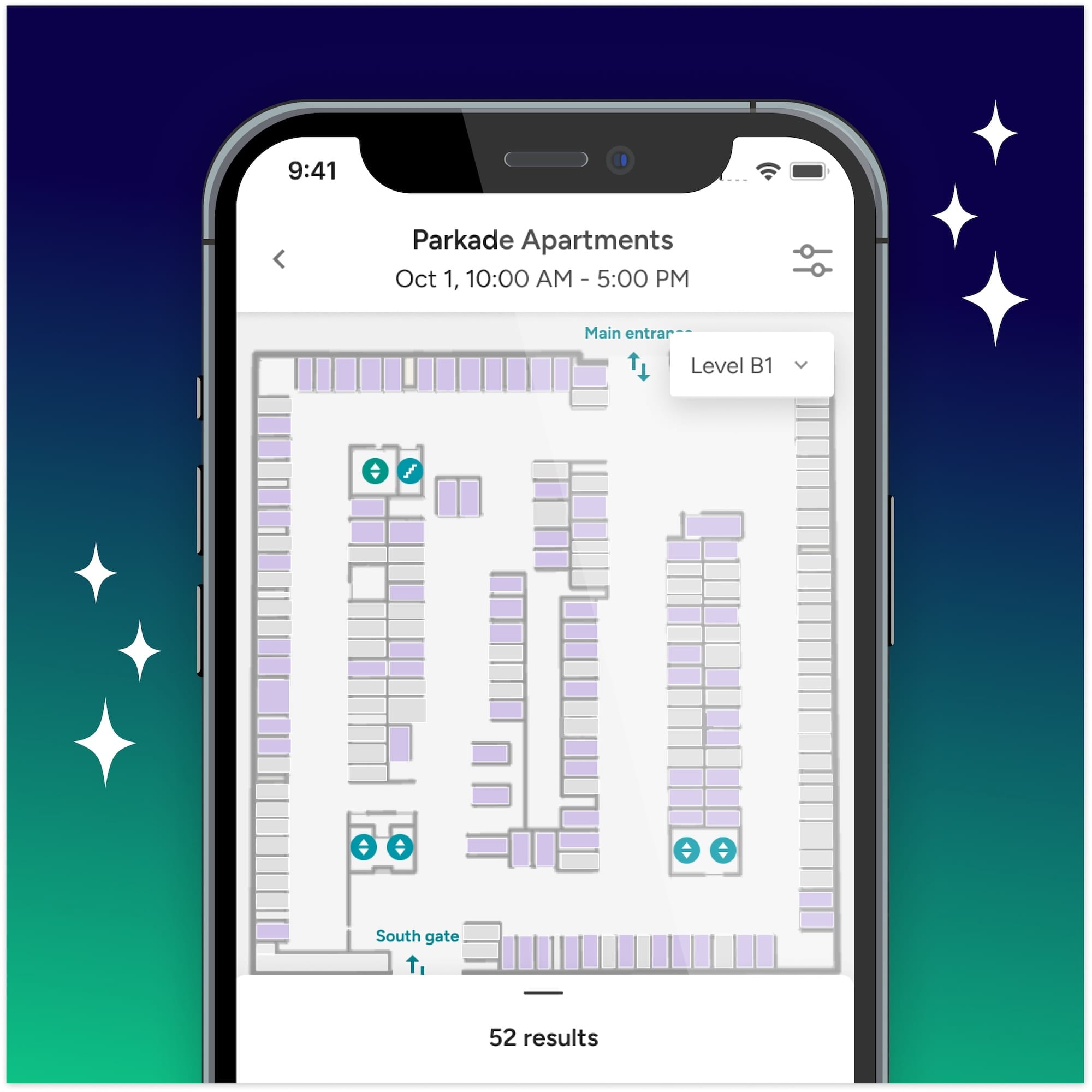

TABLE OF CONTENTS
Finding a parking spot at work is not just challenging but also frustrating. If you don’t get to work on time, or before all the other employees, you may have to park blocks away and walk to the office.
I faced this challenge as an employee at Lyft, and I’d love to share what I learned about how we fixed our parking. What I learned at Lyft led me to create Parkade to help solve the problem of parking at work in a better, affordable way.
The end result was Parkade, an app that makes it possible for workplaces to offer reserved parking and better utilize the existing parking spots, so everyone has a chance to park. Now, Parkade works with workplaces and transportation demand management organizations to provide a much easier way to roll out reserved (and potentially paid) parking to employees.
When rolling out reserved, monthly parking at our own office a few years ago and in the time since, we learned a lot about how to address equity. Here’s our advice based on what we’ve learned.
Consider having multiple price points available to your employees.
If you have a big lot, you could charge $5 for parking spots near the door, $3 for parking further away and leave the remaining spots free. This helps people choose what their time and convenience is worth, and offers a free option for employees with smaller transportation budgets.
Their choice may have less to do with income than expected, as some high earners may be happy to save a few bucks while lower earners value their time more.
Switching immediately from free parking to costly parking could cause some commotion and surprise among your employees. Instead, keep the costs low and you’ll quickly realize that even charging just a couple of dollars a day can make a huge dent in demand.
Rather than investing in expensive hardware to implement reserved parking, keep the company’s costs low by using a good virtual experience. There’s no need for gates, sensors, and attendants to charge for parking. You can use Parkade to make spots reservable and more reliable while creating a new revenue stream at the same time.
The tax code allows commuters to pay for parking pre-tax. It's optional, but Parkade enables employers to charge employees a pre-tax price for reliable parking in advance.
This reduces the cost of paying for parking, using pre-tax dollars instead of post-tax dollars. This tax advantage can drastically reduce the real cost of paying for parking for your employees, while allowing you to keep 100% of the dollars collected.
For example, an employee making $100,000/yr may pay $5/day to park, but the “real cost” to them would only be around $3. The company can keep the whole $5, and use that money as desired (more on that below).
There are two ways to reduce the demand for parking. Charging parking or making it more expensive is one possibility. Creating incentives to drive (or park) can also be an effective way to reduce the number of people who park at your office.
This can form a key approach for creating an equitable strategy — build strong incentive programs that reward people for good habits. Using our program as an example, we charged about $7/day to park at our office. Rather than discount that price by income, which was considered, we used that money to create a cash-out program for anyone who didn’t drive.
Here is how our program functioned. Those who drove to work paid $7/day or $175/month. Those who didn’t drive to work received a $75/mo bonus. This program was hugely impactful for employees at the low end of the income spectrum, most of whom already didn’t drive to work and received an extra $75/mo for sticking with that commute choice. Those who did drive to work decided to park away from the office instead and keep their bonus.
It’s always important to communicate that free parking isn’t equitable. By giving away parking — something a city or business pays handsomely for — those who drive are getting subsidized.
Low-wage earners are much less likely to own a vehicle, meaning that it’s often wealthier workers getting subsidized to drive while their coworkers who don’t earn as much don’t receive an equivalently expensive subsidy for their commute. Keeping parking free encourages more people to drive to work. Having to pay for parking costs might change their minds and help them realize that free parking actually isn’t equitable.
One of the innovative things we did at our office was making the parking spots reshareable. People who booked a monthly spot could share it with their colleagues when they didn’t come to work.
Those who earn a lot of money might not even bother to recoup that $7/day. But those who earn less truly appreciated the ability to get their hard-earned money back.
Many TDMs have pushed for daily parking over monthly parking so that employees could decide every day whether to drive to work or not. With Parkade’se help, employees who purchase monthly parking can earn their money back each day they don’t use their spot. It ends up being a daily decision after all.
One of the reasons there’s a crunch for parking in many downtowns is that off-street parking is used inefficiently. Apartment parking is likely empty during the day, and office parking is likely empty at night. This means more competition for on-street and garage. If there’s any way to get more of those buildings to use their lots better, that can help tremendously. We work with many apartment buildings, workplaces and mixed-use buildings to better utilize their off-street parking and increase street parking availability.
Parkade makes it possible for workplaces to offer reserved and more reliable parking. There's never been a better time to bring reliability to parking in your company.
Parkade is a smartphone application that transforms any workplace parking lot into a lot with reservable parking for employees who work there. All you need is numbered parking and we’ll take care of the rest.
Here is how Parkade can help you out.
End parking frustration and give your employees reliable parking — enabling them to reserve parking at work, ahead of time. Your team will love it.
If you want to ensure parking reliability and predictability to your employees, then offer them monthly parking. Those who reserve monthly spots will even be able to reshare them with others on days when their plans change and they don't drive to work.
Parkade makes it easy for your workplace to offer reserved parking. Once you've added some or all of your numbered parking spots to Parkade and invited your employees, they'll be able to instantly book parking at work.
You can even offer parking daily (only one person can park in a spot each day) or hourly (for workplaces that have multiple shifts).
Companies have very little information on how often each parking spot is used. Parkade shares this valuable data to help companies better plan for the future. The Parkade app has been designed to suit the specific needs of your company.
Using Parkade, employers can offer reserved parking to their employees for free or for a price. From our experience, it is for the best when parking is limited.
You can offer your employees to pay via pre-tax options like WageWorks or Navia commuter benefits cards. Different prices can be set for hourly, daily and monthly reservations.
The balance that accumulates and can be withdrawn at any time via ACH or debit card by your company admin.
Parkade maximizes the usage of your company’s parking lot and can even be used to reduce the demand for parking. This enables you to base your real-estate decisions around your team, not your parking.
Many variables decide how many spaces should go on your Parkade network. It's worth asking your employees who is interested in this new perk so that you could keep some of the spots open and free for the rest of the employees.
Parkade allows you to make some or all of the parking spots in their parking lot available for daily or monthly reservations. This feature is especially useful if you have a limited number of EV chargers to a larger number of electric vehicles. Your employees will know in advance whether they’ll be able to charge their EVs at work.
Last but not least, you can use Parkade to charge your employees (a pre-tax) price for reserving reliable parking in advance. Not only will this help utilize existing parking spots better, but it will also generate a funding stream that employers can use for subsidizing something else.
.jpg)
As parking management becomes increasingly digital, security becomes critical — and we’re excited to share that we've achieved a major security milestone.
Read Story
We’re thrilled to announce one of our most significant leaps forward this year: the launch of dynamic maps across our mobile and web applications.
Read Story
Now that AB 1317 is official, it’s time to brush up on the requirements and see how your properties stand to benefit.
Read Story